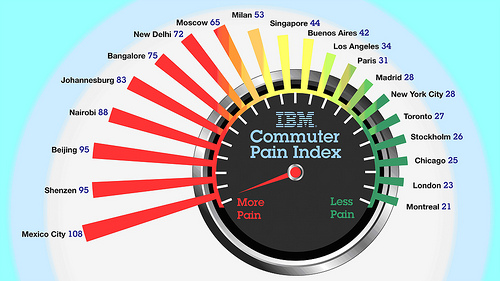A survey of over 8,000 commuters in 20 cities across 6 continents yields an alarming result. By and large, commuters in emerging economies face traffic conditions that are far worse than those who live in the U.S. and Europe.
Geographic location appears to be the determining factor that essentially bifurcates the cities on the pain index. Those that received a high index "score" mostly belong to BRIC nations (save Brazil) whereas the rest are located in developed, first-world countries.
Most miserable place for commuters, according to IBM? Mexico City.
There is a silver lining amid these despondent numbers, however. Melissa Lafsky quips, "Forty one percent of commuters globally said improved public transportation would help reduce stress. And that's in part out of desperation."
FULL STORY: The Newest Numbers in ‘Commuter Pain’ Worldwide

Planetizen Federal Action Tracker
A weekly monitor of how Trump’s orders and actions are impacting planners and planning in America.

Chicago’s Ghost Rails
Just beneath the surface of the modern city lie the remnants of its expansive early 20th-century streetcar system.

Amtrak Cutting Jobs, Funding to High-Speed Rail
The agency plans to cut 10 percent of its workforce and has confirmed it will not fund new high-speed rail projects.

Ohio Forces Data Centers to Prepay for Power
Utilities are calling on states to hold data center operators responsible for new energy demands to prevent leaving consumers on the hook for their bills.

MARTA CEO Steps Down Amid Citizenship Concerns
MARTA’s board announced Thursday that its chief, who is from Canada, is resigning due to questions about his immigration status.

Silicon Valley ‘Bike Superhighway’ Awarded $14M State Grant
A Caltrans grant brings the 10-mile Central Bikeway project connecting Santa Clara and East San Jose closer to fruition.
Urban Design for Planners 1: Software Tools
This six-course series explores essential urban design concepts using open source software and equips planners with the tools they need to participate fully in the urban design process.
Planning for Universal Design
Learn the tools for implementing Universal Design in planning regulations.
Caltrans
City of Fort Worth
Mpact (founded as Rail~Volution)
City of Camden Redevelopment Agency
City of Astoria
City of Portland
City of Laramie



























